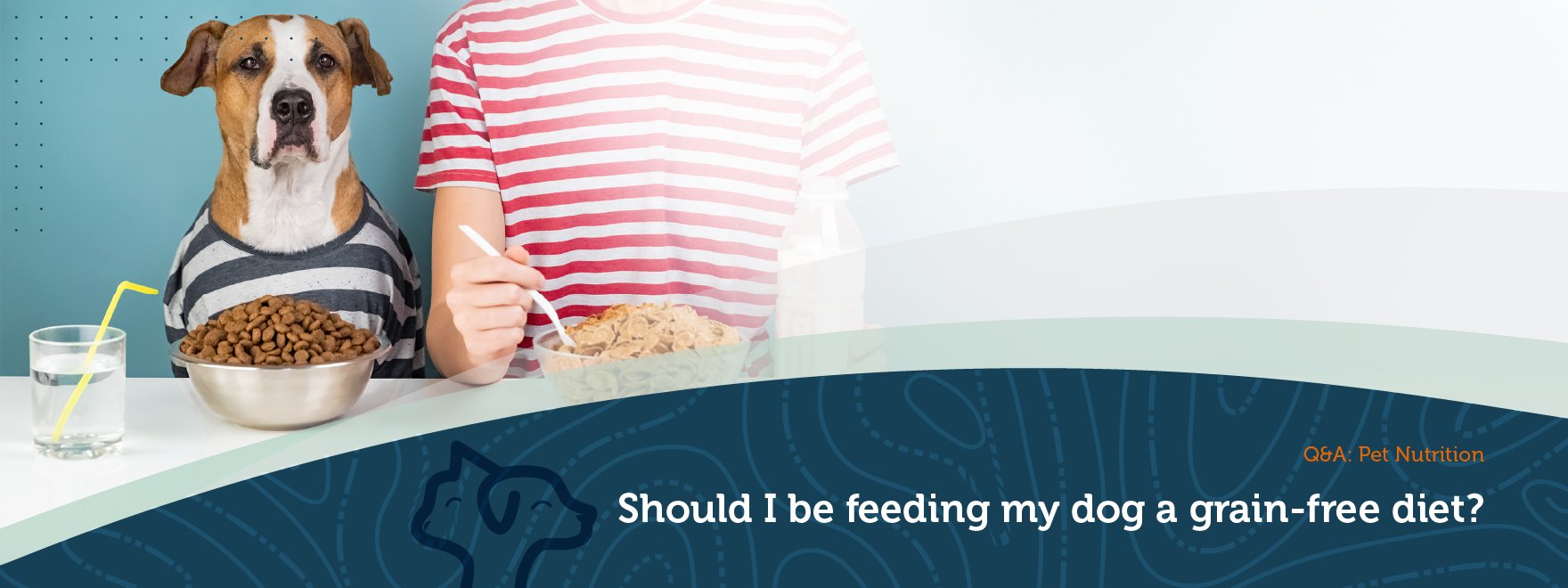Should I be feeding my dog a grain-free diet?
Should I be feeding my dog a grain-free diet?
There have been a lot of discussions about grain-free diets for dogs lately. As gluten-free and grain-free diets become more popular for humans, dog food companies jumped on the bandwagon and started promoting grain-free diets as the best way to keep your dog healthy. But is there any truth to it? Like most issues in veterinary nutrition, the answer is fairly complicated.
Background
You may have heard that dogs don’t need grains. They are descended from wolves, and wolves only eat meat. Well, that’s true. Wolves do only eat meat. But the dogs who share our lives have not been wolves for thousands of years. Their behavior and their digestive systems have evolved over this time period, to adapt to their new set of circumstances. The bacteria in their gut have changed. A wild dog will still eat a loaf of bread from a garbage can; a wolf likely will not.
Why do dogs need grains?
Grains are not just “fillers”. High-quality grains, like corn, rice, wheat, etc, provide dogs with fiber. Fiber helps keep their digestive system moving. Diets that don’t contain grains need to replace this fiber from different sources – ideally, this would be a mix of multiple types of fiber (soluble and insoluble). That’s not very easy to do when you’ve cut out an entire food group. Grains can also provide B vitamins and essential amino acids that your dog needs.
Do grain-free diets cut down on allergies?
Another argument that people use to justify grain-free diets is to treat food allergies. True food allergies are rare in dogs, but they do occur. They usually cause skin issues or upset stomachs. Only about 10% of dogs will have true food allergies. Of those, the vast majority of dogs have allergies to specific proteins, not carbohydrates. There are occasional dogs with a true gluten sensitivity or allergy to wheat, but that is quite uncommon. Therefore, feeding your dog a grain-free diet due to allergies MAY help – if the grain-free diet now has a different protein source.
Are grain-free diets higher in energy?
Grain-free diets often are richer in proteins and fats to make up for the lack of carbohydrates. This rich diet can cause digestive issues in dogs who are sensitive to fat content. However, if you have a high-performance dog, these diets may give them more energy and help maintain their weight.
What about heart disease?
Recently, veterinarians noticed an increase in a heart condition called dilated cardiomyopathy in dogs being fed grain-free diets. This has led to the US FDA putting out a warning against grain-free diets. They have not been pulled from the market because it is a multifactorial issue and there may be more to the cause than just the absence of grains. Vets are still researching why this is happening – we suspect it may be more due to the type of ingredients they use in place of other grains – peas and lentils are the biggest suspects right now. Not every dog that eats a grain-free diet will develop this condition, but you should be aware of it.
Are grain free diets cheaper?
Grain-free diets are, in general, more expensive than other diets due to the increased meat content. This expense may not be necessary. If you are currently feeding your dog a grain-free diet and they are doing well, there is no reason to change. Your vet may recommend extra monitoring to check for heart disease (such as X-rays). It’s also worth bearing in mind, that while many people believe that vets receive kickbacks from food companies, that’s not the case. However, dog food companies and pet food stores DO make more money from every bag of expensive dog food that you purchase. If you want to determine the right food for your dog, ask your veterinarian.

